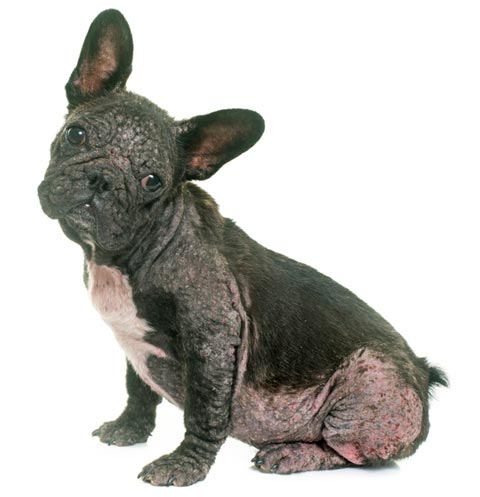Why Is Some of My Dog's Skin Turning Black?

Dogs' skin can be different pigments, ranging from pink to black, and it can be different colors in various body areas. But what if an area of your dog's skin that was previously light is turning black?
Skin Darkening May Indicate an Inflammatory Process
A dog that consistently licks at a certain area of her skin might experience darkening of the pigment there. If the fur in the area is light, it will often turn brown or dark red from the licking, and the skin can darken and thicken over time.
Inflammation and infection from a variety of sources can cause local or widespread hyperpigmentation of a dog's skin. Some of these conditions include:
- Demodex mite infection
- Allergies
- Yeast infection
- Bacterial infection
Skin Turning Black Might Indicate a Hormonal Issue
Dogs with Cushing's syndrome, or hyperadrenocorticism experience increased levels of adrenal hormones in their bodies. One of this condition's physical signs is increased skin pigmentation, especially over the abdomen. This can also be accompanied by calcinosis cutis, or small, hard lumps in the skin of the abdomen.
Hypothyroidism, or an underactive thyroid gland, can sometimes cause skin pigment changes, too, especially over the abdomen and flanks. Other skin and coat signs associated with this condition can include hair loss or lack of hair regrowth when a patch is shaved.
Skin Cancer Must Be Considered When Skin Turns Black
Melanoma and mast cell tumors may appear as black or very dark areas of the skin. These usually show up as small, individual masses rather than large areas of smooth, hyperpigmented skin.
Bruising Can Cause Areas of a Dog's Skin to Look Dark
Bruises can appear as dark blotches on the skin that can be widespread if there's been trauma or the dog is suffering from a platelet disorder or rat poison toxicity. If an area of your dog's skin suddenly becomes darker than it was before, get her to a veterinarian right away because it could be an emergency.
Other Conditions
The above causes of darkening skin in dogs cover most of the potential causes. Sometimes, areas of the skin will darken normally with age, too.
If an area of your dog's skin is dark when it was previously light, check with your veterinarian, who will do a complete exam to determine if there is a potential cause or if it's likely to be a normal process.
You May Also Like These Articles:
Dealing With Canine Scratching and Licking
Disclaimer: This website is not intended to replace professional consultation, diagnosis, or treatment by a licensed veterinarian. If you require any veterinary related advice, contact your veterinarian promptly. Information at DogHealth.com is exclusively of a general reference nature. Do not disregard veterinary advice or delay treatment as a result of accessing information at this site. Just Answer is an external service not affiliated with DogHealth.com.


